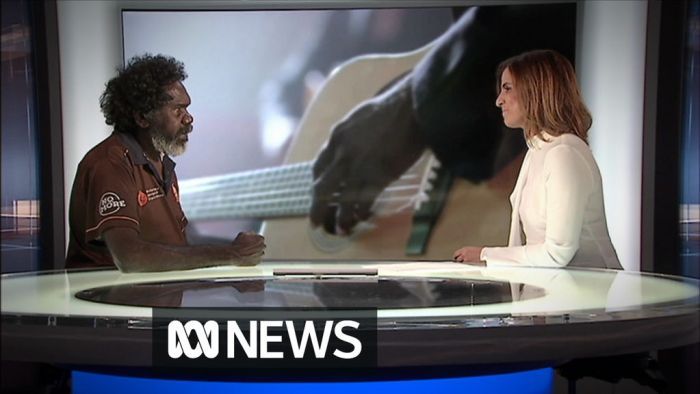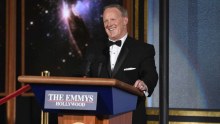Dr G Yunupingu 'the greatest voice this country recorded' as tributes flow at his state memorial in Darwin
Updated
One of Australia's most famous Aboriginal musicians, Dr G Yunupingu, has been remembered as someone who overcame great shyness due to his blindness to skyrocket to international stardom.
Dr G Yunupingu died in July at age 46 following a near-lifelong struggle with liver and kidney disease, after contracting hepatitis as a child.
Blind from birth, the singer — from the remote community of Galiwin'ku on Elcho Island, 500 kilometres east of Darwin — shot to stardom in 2008, winning an ARIA Award for his namesake album.
 Photo:
The Gospel Dance Group perform at the memorial service to Aboriginal musician Dr G Yunupingu. (ABC News: Georgia Hitch)
Photo:
The Gospel Dance Group perform at the memorial service to Aboriginal musician Dr G Yunupingu. (ABC News: Georgia Hitch)
The album hit triple platinum in Australia, silver in the UK and charted in multiple countries worldwide, selling more than half a million copies.
His state memorial opened with a welcome to country from Larrakia elder Gunlucki Nimul (June Mills) and a message from Queen Elizabeth II.
In her message, the Queen expressed her condolences and reflected on one of the musician's performances in England.
"We have fond memories of his special performance at the diamond jubilee ceremony at Buckingham Palace in 2012," it read.
The success of Dr G Yunupingu's three albums, produced by Northern Territory label Skinnyfish Music, make him the most commercially successful Aboriginal Australian musician.
"We are here today because we've lost a friend. And the country has lost the greatest voice this country ever recorded," Skinnyfish Music managing director Mike Grose said.
Yunupingu 'too shy' to go into the world
Dr G Yunupingu had previously said the first person to give him a guitar was his uncle, Djungatjunga Yunupingu.
His uncle talked about helping his nephew overcome a crippling shyness which at one point, pulled him away from his fame.
"He was too shy to go into the world because he was blind. He said to me once, 'Papa, I can't go. I can't go because I am blind'," Mr Yunupingu said in his eulogy.
 Photo:
Singer Jessica Mauboy performs a song at the funeral of musician Dr G Yunupingu. Image taken September 18, 2017. (ABC News: Georgia Hitch)
Photo:
Singer Jessica Mauboy performs a song at the funeral of musician Dr G Yunupingu. Image taken September 18, 2017. (ABC News: Georgia Hitch)
"And I said, 'go and preach. Go and tell the world about yourself, about your dignity'.
"'Imitate yourself as a crocodile. Go into the world. Take this spark of fire with you because you were born with it. Take it. And don't be shy'."
Djungatjunga Yunupingu became emotional when reflecting on Dr G Yunupingu's decision to listen to his advice.
"And he did. He went into the world. He did. He wasn't fighting for himself. He wasn't talking for himself. He was talking for all Australians to unite and walk together," he said.
"He wasn't talking for his own clan. He was talking in his own language telling the world who he was and where he came from. He was bringing people, power and participation together."
Music consultant Andrew Bowles worked with Dr G Yunupingu when his music reached the European market, and accompanied him when he played with the likes of Paul McCartney, Elton John and Stevie Wonder.
"Seeing him having his picture taken with all these greats was brilliant and a huge buzz," he said.
 Photo:
Traditional Aboriginal dancers perform at the funeral of musician Dr G Yunupingu. (ABC News: Georgia Hitch)
Photo:
Traditional Aboriginal dancers perform at the funeral of musician Dr G Yunupingu. (ABC News: Georgia Hitch)
Mr Bowles said while Mr G Yunupingu often refused to do interviews, he was lucky enough to form a connection and has memories of playing tag and eating fish and chips in hotel rooms around Europe.
"I felt honoured to make a connection, on a personal level with this incredible fella. I feel exceptionally proud and enriched in taking the music of this incredible person to a wider audience."
An ambassador for Yolngu people
Indigenous leader Reverend Djiniyini Gondarra reflected on the early days of Dr Yunupingu's life in Galiwin'ku, speaking about seeing him playing with his toys and musical instruments.
"He grown up knowing that these were the gifts and talent that he had, his music," he said.
"There was no other ways of trying to proclaim or to say something to Australian people about the land, about the sea, Aboriginal spirituality, and the genesis that he was representing was through this music that he had."
 Photo:
The memorial service to the late musician Dr G Yunupingu. Service was held in Darwin. (ABC News: Georgia Hitch)
Photo:
The memorial service to the late musician Dr G Yunupingu. Service was held in Darwin. (ABC News: Georgia Hitch)
Reverend Gondarra said Dr G Yunupingu was an ambassador for the Yolngu people of north-eastern Arnhem Land.
"We lost a great man and I hope there will be another one coming to not only represent Yolngu people but all Australians," he said.
"We are Australians, we are people with the diversity gift and him, Dr G Yunupingu ... brought something into this country ... we are proud of him."
NT Chief Minister Michael Gunner also delivered a eulogy at the service, and Jessica Mauboy was one of more than a dozen musicians and dance groups who performed in tribute.
The memorial service in Darwin was held in the 1,200-seat Darwin Convention Centre auditorium.
Dr G Yunupingu chose to stop dialysis
It was revealed that he chose to stop undergoing dialysis knowing that he would die.
"It seems increasingly clear that having missed dialysis for the longest time that he ever did, and actually having called people to say goodbye, that he was actually making a decision for himself — just as Kerry Packer did — to actually leave dialysis," his doctor Paul Lawton said.
The kidney disease specialist said the burden of dialysis, which requires patients to be hooked up to machines three times a week for five hours per session, proved too much for the singer, just as it had for many other Australians.
 Photo:
Dr G Yunupingu's 2008 album went triple platinum in Australia and sold more than half a million copies. (ABC News)
Photo:
Dr G Yunupingu's 2008 album went triple platinum in Australia and sold more than half a million copies. (ABC News)
"The extraordinary thing is not that patients struggle with it, but that some actually succeed," Dr Lawton said.
"People talk about it as a nightmare, or a half-life being in purgatory, where they are physically alive, but not fully able to participate in life."
Dr G Yunupingu's musical collaborator, spokesman, and Skinnyfish Music producer, Michael Hohnen, said the singer had been hospitalised seven times over the past year after avoiding going to dialysis "because he hated it".
"He had an enormous support team of family and doctors and an extended social group here and out bush," Mr Hohnen said.
"But some people don't like dialysis, and when he didn't want to do dialysis he used to hide."
Mr Grose said efforts to close the gap should be redoubled.
"We all need to be part of recognising that the Indigenous people that we are friends with, that we socialise with, that we work with, their life expectancy is not as great as mine as a non-Indigenous person," he said.
"And I think all of us need to take some responsibility to help work towards better outcomes for Aboriginal people.
Topics: human-interest, community-and-society, people, indigenous-music, music, arts-and-entertainment, darwin-0800, nt
First posted









